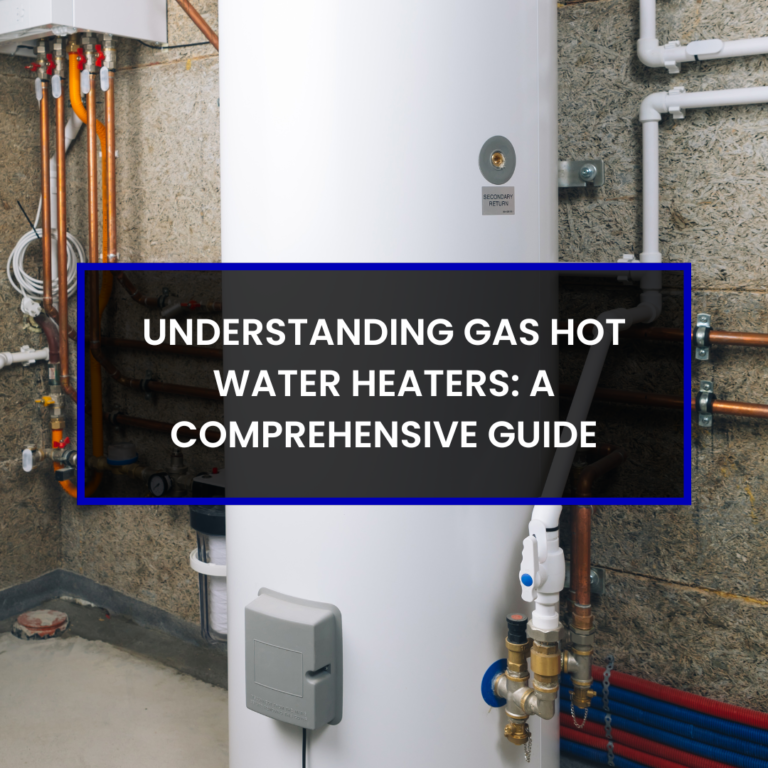Gas hot water heaters are a popular choice for homeowners due to their reliable hot water supply and potential cost savings over time. These systems use natural gas or propane to heat water, which is then stored in a tank or heated on demand in tankless systems. Understanding the operation and benefits of gas hot water heaters can help you make an informed decision about whether they’re right for your home.
How Gas Hot Water Heaters Work
Gas hot water heaters ignite gas through a burner located under a tank where water is stored. The heat from the burner is transferred to the water above through the tank’s materials, typically made of steel with a glass lining to prevent corrosion. The hot water rises in the tank and is distributed throughout your home as needed. This process is controlled by a thermostat, which ensures that the water maintains a consistent temperature.
Key Components of a Gas Hot Water Heater
The main components of a gas hot water heater include the gas burner, heat exchanger, thermostat, pilot light, and venting system. The vent is crucial as it safely removes the combustion gases from the home. The thermostat plays a critical role in regulating the water temperature, turning the heating elements on and off to maintain the desired heat level.
Benefits of Gas Hot Water Heaters
Choosing a gas hot water heater can offer several advantages, including lower operational costs and rapid water heating. They are also less dependent on electrical power, which can be particularly beneficial in areas with frequent power outages.
Cost-Effectiveness
Gas hot water heaters typically have lower monthly energy costs compared to electric heaters, especially in regions where natural gas is cheaper than electricity. This can translate to significant savings on your energy bills over the lifespan of the heater.
Efficiency and Performance
Gas hot water heaters are known for their high efficiency and quick recovery rates. They can heat a larger volume of water faster than electric models, making them ideal for families and high-demand situations.
Environmental Impact
Using natural gas is often considered more environmentally friendly compared to electricity that might be generated from coal or oil. Gas hot water heaters emit fewer greenhouse gases and have been getting increasingly efficient due to advancements in technology.
Types of Gas Hot Water Heaters
There are several types of gas hot water heaters available, each suited to different needs and preferences. Understanding these options will help you choose the best model for your home.
Conventional Storage Water Heaters
These are the most common type of gas hot water heaters. They consist of a tank that holds water to be heated. This means the water is available at any time but can also lead to energy losses through standby heat.
Tankless Gas Water Heaters
Tankless models heat water directly without the use of a storage tank. When a hot water tap is turned on, cold water travels through a pipe into the unit where a gas burner heats the water. This means you never run out of hot water and energy is not wasted in heating a tank full of water that isn’t being used.
Power Vent Gas Water Heaters
Power vent gas hot water heaters use an electrically powered fan to push exhaust gases through vent pipes that extend horizontally, rather than relying solely on natural buoyancy to expel gases vertically. This design allows for more flexible installation options since it does not require a vertical vent. Power vent models are particularly efficient and suitable for tightly sealed homes where indoor air quality is a priority.
Selecting the Right Gas Hot Water Heater
Selecting the right gas hot water heater involves understanding your household’s water usage, the heater’s capacity, and energy efficiency ratings. Here’s how to compare different models to find the best fit for your needs.
Understanding Capacity and Demand
When choosing a gas hot water heater, it’s important to consider the size of the tank or the flow rate of a tankless system. The right size depends on the number of people in your household and your simultaneous water needs. A typical family of four might opt for a 50-gallon tank, but larger families or homes with high water usage might need more capacity or prefer the endless supply of a tankless system.
Comparing Different Models
Comparing gas hot water heaters involves looking at their energy factor (EF) ratings, which indicate a unit’s overall energy efficiency based on the amount of hot water produced per unit of fuel consumed. Higher EF ratings typically signify a more efficient heater, which can lead to lower annual operating costs. Also, consider the warranty and longevity of the models, as these can impact long-term satisfaction and cost-effectiveness.
Installation and Maintenance
Proper installation and regular maintenance are crucial for maximizing the efficiency and lifespan of your gas hot water heater. Here are some tips to ensure optimal performance.
Professional Installation Tips
Gas hot water heaters should always be installed by a qualified professional to ensure safety and compliance with local codes. This includes proper handling of the gas line and venting system to prevent leaks and ensure efficient operation. An expert installation also helps maximize the unit’s efficiency and longevity.
Routine Maintenance and Safety
Regular maintenance of gas hot water heaters is essential to ensure they operate safely and efficiently. This includes checking the venting system for blockages, testing the temperature and pressure relief valve, inspecting the anode rod to prevent corrosion, and flushing the tank to remove sediment buildup. Annual inspections by a professional can help identify issues before they lead to significant problems or inefficiencies.
Hometown Heating’s Gas Hot Water Heaters
At Hometown Heating, we’re proud to offer an extensive selection of top-quality gas hot water heaters, including our new line of ENERGY STAR qualified power vent water heaters. Contact us today!
Featured Models and Their Benefits
Our John Wood power vent models are among the best in the industry, offering superb performance and ultra-quiet operation. These heaters are designed for a variety of applications, including combo-heating systems, making them a versatile choice for any home. With .70 EF ratings and .68 EF on the 75-gallon models, these heaters are designed to maximize energy efficiency and minimize waste.
Why Choose Our ENERGY STAR Qualified Power Vent Water Heaters?
Choosing our ENERGY STAR qualified power vent gas hot water heaters means enjoying substantial energy savings and excellent hot water delivery. The advanced design ensures a quiet operation and reliable performance, making them a great investment for your home. Plus, our expert team at is always ready to provide professional installation and maintenance services to keep your system running smoothly.
Frequently Asked Questions
What are the signs that my gas hot water heater needs repair or replacement?
Watch for signs like inconsistent water temperature, reduced hot water supply, noisy operation, or visible rust or water leakage around the tank.
What is the lifespan of a typical gas hot water heater?
Most gas hot water heaters have a lifespan of 8 to 12 years, depending on the model, maintenance routine, and water quality in your area.
What are the most energy-efficient gas hot water heaters on the market?
Look for models with high energy factor (EF) ratings and those labeled as ENERGY STAR qualified, like the condensing and power vent models.
How can I improve the energy efficiency of my existing gas hot water heater?
Regular maintenance, insulating the tank, and setting the thermostat to an optimal temperature can improve efficiency.
What is the difference between direct vent and power vent gas hot water heaters?
Regular maintenance, including flushing the tank, checking and replacing the anode rod, and ensuring all connections are tight, can extend the life of your heater and prevent leaks.
Can I install a gas hot water heater myself?
DIY installation is not recommended due to the complex and potentially hazardous nature of the work involving gas and venting systems. Professional installation is advised.





